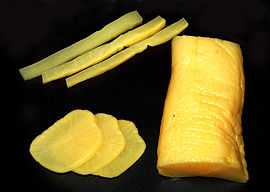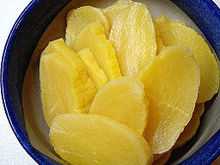Takuan

Takuan (沢庵), also known as takuwan or takuan-zuke, is pickled daikon radish. Takuan is often served alongside other types of tsukemono in traditional Japanese cuisine, and is also enjoyed at the end of meals as it is thought to aid digestion. In Korean it is known as danmuji (단무지) and is typically added to gimbap or served as a side dish in Korean Chinese cuisine.
Production
The first step in the traditional process of making takuan is to hang a daikon radish in the sun for a few weeks until it becomes dehydrated and flexible. Next, the daikon is placed in a pickling crock and covered with a mix of salt, rice bran, optionally sugar, daikon greens, kombu, perhaps chilli pepper and/or dried persimmon peels. A weight is then placed on top of the crock, and the daikon is allowed to pickle for several months. The finished takuan is usually yellow in color and quite pungent, though most mass-produced takuan uses salt or syrup to reduce the dehydration time, and is colored artificially. Iburi-gakko (lit. smoked takuan) is eaten in Akita Prefecture. It is smoked rather than sun-dried before pickling.
History
Takuan Sōhō is credited with concocting this yellow pickle, which now bears his name.[1]
Usage

Usually, takuan is washed with water, the excess brine removed and it is sliced thinly before serving. It is eaten as a side dish in meals, and eaten as a snack at teatime. Strip-cut takuan is often used for bento. Traditional takuan—using sun-dried daikon radish and pickled in rice bran bed—is sometimes stir fried or braised when getting older and sour. Some sushi rolls use strip-cut takuan for ingredients such as shinkomaki (takuan only), torotaku-maki (fatty tuna and takuan).
In popular culture
Takuwan is mentioned in a science fiction story by Allen Kim Lang called "The Chemically Pure Warriors". The story appears in the science fiction anthology Body Armor: 2000 (ISBN: 0-441-06977-0). In the story colonists of a planet claim that a microbe is responsible for their lack of disease and that, "They cause turnips to become takuwan".
See also
References
| Wikimedia Commons has media related to Takuan. |
- ↑ Nagamura, Kit. "All at sea in Shinagawa". The Japan Times Online. October 5, 2007. Accessed July 11, 2011.